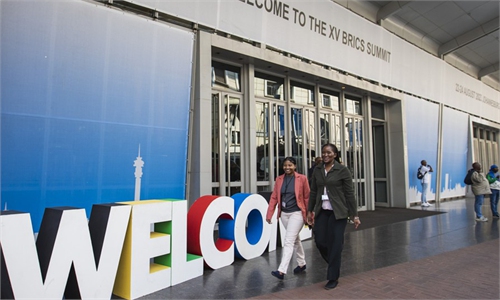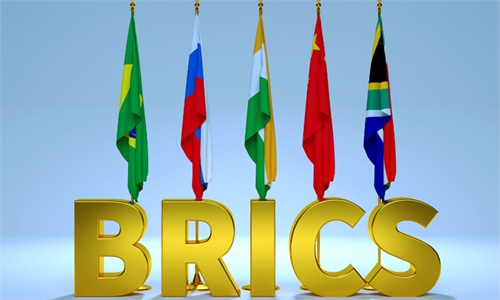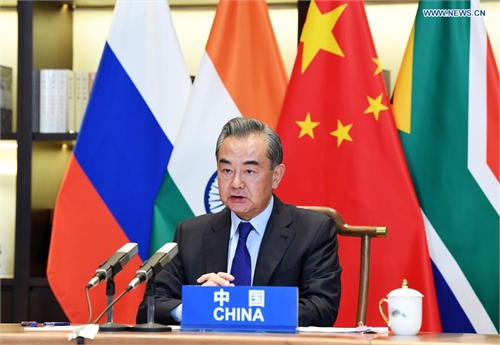
Wang Yi, a member of the Political Bureau of the Communist Party of China Central Committee and Minister of Foreign Affairs, meets with Jeenbek Kulubaev, Minister of Foreign Affairs of Kyrgyzstan, in Almaty, Kazakhstan, April 26, 2025. Photo: VCG
Chinese Foreign Minister Wang Yi met with Jeenbek Kulubaev, Minister of Foreign Affairs of Kyrgyzstan, in Almaty, Kazakhstan, on Saturday. The two sides agreed to support free trade, uphold multilateralism, and enhance cooperation, according to Chinese Foreign Ministry on Sunday.
As close neighbors connected by mountains and rivers, China and Kyrgyzstan have always treated each other with trust and sincerity and are reliable and trustworthy brothers and partners, said Wang, a member of the Political Bureau of the Communist Party of China Central Committee.
China firmly supports Kyrgyzstan in pursuing a development path suited to its national conditions, strongly opposes any external interference in Kyrgyzstan's internal affairs under any pretext, said Wang, voicing confidence that Kyrgyzstan will continue to support China's legitimate position on issues concerning its core interests, according to Xinhua.
During the meeting, the two sides reviewed key Belt and Road cooperation projects, agreed to steadily advance the construction of the China-Kyrgyzstan-Uzbekistan railway, further explore areas of common interest, enrich the content of bilateral relations and facilitate people-to-people exchanges.
Kulubaev noted that China has become Kyrgyzstan's largest trade and economic partner and that Kyrgyzstan welcomes Chinese enterprises to invest and operate in the country and is committed to providing a favorable business environment, the report said.
Based on the official information, the China-Kyrgyzstan-Uzbekistan railway project is an important topic between the two countries, Sun Xiuwen, an associate professor at the Institute for Central Asian Studies at Lanzhou University, told the Global Times on Sunday.
On tariff issues, both sides agreed that upholding multilateralism is the greatest common ground and stressed the importance of strengthening coordination and jointly addressing challenges, according to Xinhua.
Regarding the tariff issues and China's position on behalf of developing countries, Sun noted that this reflects China's diplomatic stance as an ex-officio member of the Global South and its strategic intention to push for a more fair and inclusive international order. Essentially, it is a call for a shift in global trade and economic order toward "inclusive globalization" characterized by equitable development and shared prosperity.
Cui Heng, a scholar at the Shanghai-based China National Institute for SCO International Exchange and Judicial Cooperation, agreed with Sun's views. Protecting the economies of developing countries was once a global consensus, but the US' tariff policies have clearly disrupted this consensus, severely damaging the interests of Global South nations, he said.
They discussed enhancing cooperation within the framework of the Shanghai Cooperation Organization (SCO). The Kyrgyz side expressed support for China's chairmanship of the SCO and the upcoming summit to be held in northern China's Tianjin later this year, per report.
Sun said the cooperation within the framework of the SCO in emerging fields such as clean energy, critical minerals, and agricultural modernization could be potential topics of conversation between two countries. It could also include enhancing people-to-people exchanges, such as simplifying travel procedures and fostering social interactions.
Furthermore, joint efforts to combat the "three forces" of terrorism, separatism and extremism and transnational crimes, as well as maintaining regional security and stability, are expected to be key topics of discussion, Sun added.
After his trip to Central Asia, Wang is scheduled to attend the Meeting of BRICS Ministers of Foreign Affairs / International Relations and the 15th Meeting of BRICS National Security Advisers and High Representatives on National Security in Brazil, according to the Foreign Ministry on Wednesday.
In response to media inquiry over the announcement, Chinese Foreign Ministry spokesperson Guo Jiakun stated on Wednesday that the Meeting of BRICS Ministers of Foreign Affairs / International Relations will be held in Rio de Janeiro, Brazil, from Monday to Tuesday. Wang will exchange views with other parties on BRICS cooperation, the current international and regional situation, and other issues of mutual interest, and lay the groundwork for the 17th BRICS Summit.
BRICS is emerging as a backbone of cooperation and an engine of growth in the Global South. This will be the first meeting of BRICS ministers of foreign affairs / international relations after BRICS was joined by Indonesia as a new member. China stands ready to work with other parties to jointly build a more comprehensive, close, practical and inclusive partnership, contribute to safeguarding multilateralism and defending justice and fairness, and advance the high-quality development of Greater BRICS Cooperation, said Guo.
Therefore, Sun noted that the Meeting of BRICS Ministers of Foreign Affairs / International Relations is likely to address key issues related to the distribution of rights and responsibilities between new and existing members, as well as common concerns shared by all members.
Sun speculated that these issues will include coordinating positions on regional conflicts and enhancing technological self-reliance in critical areas such as quantum computing, 6G and biotechnology. Additionally, further discussions are expected on global challenges such as climate financing and energy transition.
Moreover, Xue said the current policies of the US government are accelerating the collapse of the Western-centered global economic order. "Although the new economic order will not materialize overnight, BRICS cooperation is playing a pivotal role in shaping and advancing this transformation," he added.



